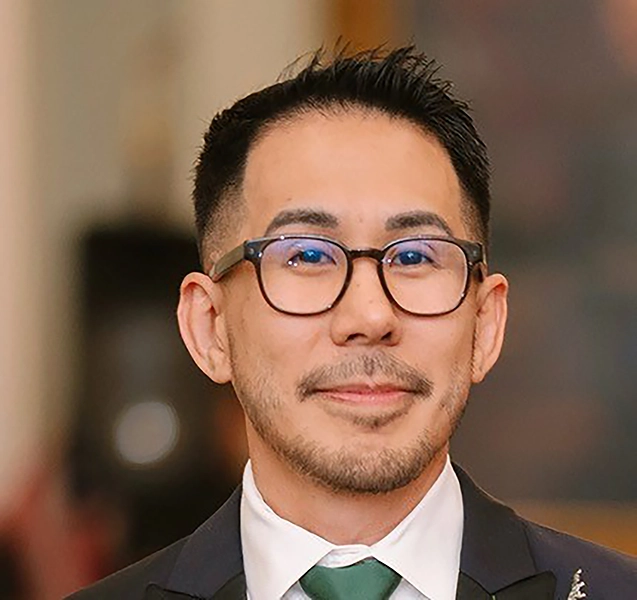mental health awareness month >>
shifting the conversation
Mental health awareness month: Shifting the conversation with Tuan Le
Tuan Le shares how confronting chronic stress became a catalyst for growth, empowering him to reclaim his well-being both personally and professionally.
At Sabre, we are committed to embracing and celebrating our diversity. In this inclusion & engagement series, Shifting the Conversation, our people share their stories to engage in open dialog and shed light on their broad, rich and unique perspectives. In honor of Mental Health Awareness Month, Tuan Le, Director of Total Rewards on our Global Compensation team, shares how confronting chronic stress became a catalyst for growth, empowering him to reclaim his well-being both personally and professionally.
Stress is one of those silent killers in life, often dismissed, normalized or worn like a badge of honor. In our fast-paced, always-connected world, feeling overwhelmed has somehow become a default setting. However, when stress goes unchecked, it does more than depletes our energy; it slowly chips away at our mental health.
I had this realization after my body started responding negatively to the effects of stress.
At first, I was having trouble sleeping. Then it slowly turned into restlessness, irritability and constant fatigue. I kept telling myself it was just a rough patch—maybe a few busy weeks at work, a long to-do list or too much caffeine, but deep down I knew something was off. I started losing patience with loved ones and pulling away from things I once enjoyed. Every morning, I woke up with a tight, anxious feeling in my chest like I was bracing for impact. Stress had become my new normal, and I didn’t know how to escape it.
It wasn’t until a minor panic attack at the gym that I finally realized the toll stress had taken on me. I remember standing next to a machine, trying to catch my breath, wondering how I had let things get this far. It wasn’t a dramatic or life-threatening moment, but it was a turning point, one that made me realize something had to change. The first thing I learned was that stress isn’t just “in your head.” Stress manifests in the body, rewires the brain and directly affects decision making, memory and relationships. Chronic stress had distorted my perspective. I wasn’t just tired; I was burned out, anxious and emotionally numb.
Seeking the necessary help, I needed wasn’t easy, but it was essential to help rewire my brain to manage stress differently.
I started this process with techniques I learned in therapy, where I began unpacking the unrealistic expectations I placed on myself. I realized how often I equated rest with laziness, how deeply I feared disappointing others and how uncomfortable I was with the idea of slowing down. I also began practicing mindfulness, not the trendy kind, but the quiet, messy, everyday kind: breathing deeply before meetings, saying no without guilt and taking walks without my phone.
Small changes, like setting boundaries for myself, mattered. I started protecting my mornings, setting work limits and carving out moments of stillness. It wasn’t a magical transformation, but over time, I began to feel more clear headed, calm and present. I felt like myself again. Stress didn’t completely disappear from my life, but it no longer consumes me because of the small changes I’ve made.
Now, I pay attention to the signals: irritability, racing thoughts and feelings of not being enough. I’ve learned to ask for help before I reach a breaking point. Most importantly, I no longer see stress as something to “power through,” but as a message, one that tells me I need care, space and compassion.
Mental health isn’t just about avoiding breakdowns. It’s about learning how to live in balance, even when life is chaotic. Stress, when understood and addressed, can be a guide, a signal that your body is telling you to slow down.
I am grateful to work for a company that believes in the overall wellness of its team members and provides the necessary tools and programs to support mental health. I encourage each team member to explore the great programs offered, such as the Employee Assistance Program and the Calm app.
Most importantly, recognize that you are not alone on this journey.
Sabre is shifting the conversation with stories from passionate and bold inclusion group members. At the heart of our inclusion & engagement efforts, our eight inclusion groups, and counting, aim to amplify the voices of our team members and create a sense of belonging for all. Together, we celebrate diversity, applaud individuality and embrace unique perspectives to empower our global team members to bring their true selves to work every day. Learn more about our inclusion & engagement mission.
about the author

As Director of Total Rewards on our Global Compensation team, Tuan Le is a natural-born leader, applying his team member benefits expertise on a global scale. He designs and delivers compensation strategies that attract and retain top talent. Tuan helps fuel the innovation and performance that drive value for our customers by building programs that support and empower our teams.
